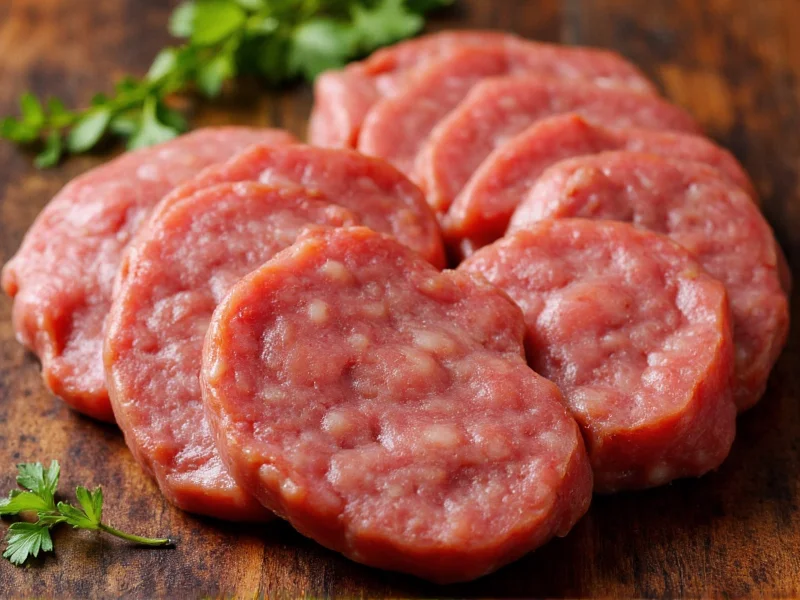Understanding Halal Sausage: More Than Just Pork-Free
Many consumers mistakenly believe that halal sausage simply means “pork-free,” but the requirements are significantly more comprehensive. True halal sausage adheres to strict Islamic dietary laws that govern not only ingredients but also animal treatment, slaughter methods, and production processes. This distinction is crucial for Muslim consumers who follow halal dietary guidelines as part of their religious practice.
The Religious Basis of Halal Meat Products
Halal, meaning “permissible” in Arabic, refers to foods that comply with Islamic law as outlined in the Quran. For meat products like sausage, several specific requirements must be met:
- The animal must be slaughtered by a Muslim who recites a dedication (tasmiya or shahada)
- The slaughter method (dhabiha) involves cutting the throat, windpipe, and blood vessels in the neck while leaving other organs intact
- Animals must be alive and healthy at the time of slaughter
- Blood must be fully drained from the carcass
- Animals cannot be slaughtered in the name of anyone other than Allah
Halal Sausage Production Requirements
Creating authentic halal sausage involves multiple considerations beyond the meat itself. The entire production chain must maintain halal integrity:
| Production Stage | Halal Requirements | Common Non-Halal Issues |
|---|---|---|
| Meat sourcing | Halal-slaughtered animals only | Pork inclusion, non-halal slaughtered meat |
| Ingredients | No alcohol, blood, or non-halal derivatives | Wine-based flavorings, pork fat, non-halal enzymes |
| Processing equipment | Dedicated or thoroughly sanitized equipment | Cross-contamination with haram substances |
| Storage and transport | Separate from non-halal products | Mixed storage with prohibited items |
Identifying Authentic Halal Sausage
With increasing demand for halal products, consumers need reliable ways to verify authenticity. The most trustworthy method is looking for certification from recognized halal authorities. Reputable certification bodies include:
- Islamic Food and Nutrition Council of America (IFANCA)
- Halal Certification Authority (UK)
- GCC Standardization Organization (for Middle Eastern products)
- National Halal Boards in various Muslim-majority countries
When examining halal sausage products, check for:
- Clear halal certification logo from a recognized authority
- Certification number that can be verified
- Complete ingredient list with no ambiguous terms like “natural flavors”
- Manufacturer information that allows verification of claims
Common Misconceptions About Halal Sausage
Several misunderstandings persist about halal sausage that can lead to confusion:
“All beef sausage is automatically halal” – While beef sausage avoids pork, it may still contain non-halal ingredients or be produced on equipment used for haram products. The slaughter method is equally important.
&ldquo>Halal slaughter is inhumane” – Scientific studies have shown that proper dhabiha method, when correctly performed, results in rapid loss of consciousness comparable to other approved slaughter methods.
&ldquo>Halal certification is just a money-making scheme” – Reputable certification bodies maintain strict standards and conduct regular audits to ensure compliance.
Regional Variations in Halal Sausage
Halal sausage traditions vary significantly across different cultures:
- Middle Eastern: Often features lamb or beef with spices like cumin, coriander, and sumac
- South Asian: Typically includes chicken or beef with distinctive curry spices
- Balkan: Features spiced beef or lamb similar to traditional cevapi
- Western commercial: Increasingly available in supermarkets, often as beef or turkey sausage
These regional varieties maintain halal compliance while reflecting local culinary traditions, demonstrating how halal food principles can adapt to diverse cultural contexts without compromising religious requirements.
Practical Guidance for Consumers
When purchasing halal sausage, consider these practical steps to ensure authenticity:
- Look for certification from a reputable halal authority rather than relying solely on “halal” claims
- Contact the certifying body to verify the certification's validity
- Ask manufacturers specific questions about their production process
- Be wary of products with vague ingredient lists or missing certification details
- Consider purchasing from specialty halal butchers or established halal food brands
Understanding the complete halal sausage certification process helps consumers make informed choices that align with their dietary requirements. The growing availability of certified halal sausage in mainstream markets reflects increasing awareness of diverse dietary needs while maintaining religious compliance.
Frequently Asked Questions About Halal Sausage
Can halal sausage contain any pork derivatives?
No, authentic halal sausage cannot contain any pork or pork derivatives. This includes not only visible pork meat but also pork-based additives, enzymes, or flavorings. Even trace amounts of pork contamination would render the product non-halal.
Is all beef sausage considered halal?
Not necessarily. While beef sausage avoids pork, it must also meet other halal requirements including proper Islamic slaughter of the animals, absence of alcohol or non-halal additives, and production in facilities that prevent cross-contamination with haram substances. Beef sausage without proper halal certification may not comply with all requirements.
How can I verify if sausage is truly halal certified?
Look for a certification logo from a recognized halal authority, check for a certification number that can be verified on the certifier's website, examine the ingredient list for completeness, and contact the manufacturer for details about their halal compliance process. Reputable certification bodies maintain online databases where you can verify certification status.
What makes halal sausage different from kosher sausage?
While both follow religious dietary laws, halal and kosher sausages have different requirements. Halal requires Muslim slaughter with specific invocation, while kosher requires Jewish supervision (shechita). Pork is prohibited in both, but halal also forbids alcohol in production, while kosher has additional restrictions on mixing meat and dairy. The certification processes and overseeing authorities differ between the two traditions.
Does halal sausage taste different from regular sausage?
The taste difference depends on the specific recipe and ingredients. Some halal sausages use alternative spices to compensate for the absence of certain non-halal flavorings, which may create a distinctive taste. However, many modern halal sausages are designed to closely resemble the flavor profile of conventional sausages while maintaining halal compliance through ingredient substitution and proper production methods.











 浙公网安备
33010002000092号
浙公网安备
33010002000092号 浙B2-20120091-4
浙B2-20120091-4